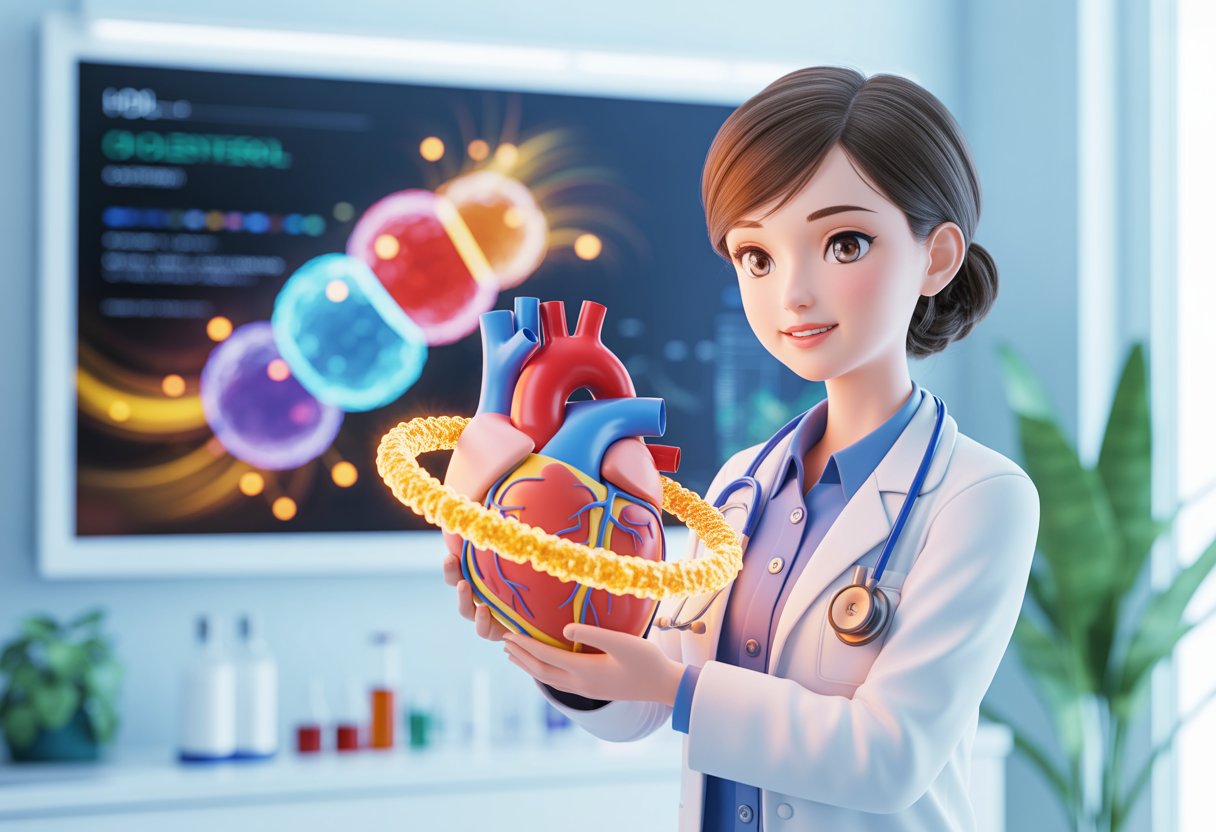Most people know that HDL is the “good” cholesterol that protects heart health, but many don’t realize that having too much can actually be harmful. While HDL cholesterol above 80 mg/dL for both men and women is considered abnormally high and may increase the risk of cardiovascular problems, creating a U-shaped curve where both very low and very high levels pose health risks.

Recent research has challenged the long-held belief that higher HDL levels are always better. Studies show that people with extremely high HDL cholesterol may face similar heart disease risks as those with low levels. This discovery has changed how doctors view cholesterol management and patient care.
Understanding what causes high HDL and when it becomes problematic can help people make better decisions about their health. Genetics, certain medications, liver conditions, and thyroid disorders can all push HDL levels beyond the optimal range where they provide protective cardiovascular benefits[1].
Key Takeaways
- HDL cholesterol above 80 mg/dL is considered abnormally high and may increase heart disease risk instead of providing protection
- Very high HDL can result from genetic disorders, certain medications, liver problems, or thyroid conditions
- Most doctors focus on managing LDL cholesterol rather than treating high HDL levels directly
What Is HDL Cholesterol and Why Is It Called Good Cholesterol?

HDL cholesterol helps protect against heart disease by removing excess cholesterol from the body. Understanding how it differs from other types like LDL and VLDL helps explain why doctors check these levels through lipid panel tests.
How HDL Works in the Body
HDL cholesterol is called “good” cholesterol[2] because it removes harmful cholesterol from the bloodstream. HDL stands for high-density lipoprotein, which acts like a transport system in the blood.
These lipoproteins pick up extra cholesterol from blood vessels and other parts of the body. They carry this cholesterol to the liver for processing.
The liver breaks down the cholesterol that HDL delivers. It then removes this cholesterol from the body through waste products.
HDL also fights inflammation in blood vessels. This helps prevent damage that can lead to heart problems.
HDL particles help prevent blood clots[2] from forming. Blood clots can block arteries and cause heart attacks or strokes.
Higher HDL cholesterol levels mean more protection against heart disease. The body needs enough HDL particles to clean up excess cholesterol effectively.
Differences Between HDL, LDL, and VLDL
Two main types of lipoproteins carry cholesterol[3]: HDL and low-density lipoprotein (LDL). Each type affects heart health differently.
HDL (Good Cholesterol):
- Removes cholesterol from arteries
- Protects against heart disease
- Higher levels are better
LDL (Bad Cholesterol):
- Carries cholesterol to arteries
- Can build up in artery walls
- Lower levels are better
VLDL (Very Low-Density Lipoprotein):
- Carries triglycerides and some cholesterol
- Can also contribute to artery buildup
- Should be kept low
LDL cholesterol sticks to artery walls and creates plaque. This narrows arteries and makes heart attacks more likely.
HDL does the opposite by pulling cholesterol away from artery walls. This is why doctors want HDL levels to be higher and LDL levels to be lower.
Normal HDL Ranges and Cholesterol Tests
A lipid panel measures all types of cholesterol in the blood. This cholesterol test shows HDL, LDL, VLDL, and total cholesterol levels.
Normal HDL ranges vary by gender[2]:
| Gender | Low HDL | Normal HDL | High HDL |
|---|---|---|---|
| Males | Below 40 mg/dL | 40-80 mg/dL | Above 80 mg/dL |
| Females | Below 50 mg/dL | 50-80 mg/dL | Above 80 mg/dL |
Children and teens need HDL levels between 45-80 mg/dL[2]. These ranges help doctors assess heart disease risk.
The cholesterol test requires a simple blood draw. Most people need this test every 4-6 years starting at age 20.
Doctors also look at cholesterol ratios. The ratio of total cholesterol to HDL cholesterol helps show overall heart disease risk.
What Does It Mean If My HDL Cholesterol Is High?

High HDL cholesterol levels can range from beneficial to concerning depending on how elevated they are. Most high HDL levels are protective for heart health, but extremely elevated levels may signal underlying genetic conditions.
Desirable vs Very High HDL Levels
Normal HDL cholesterol ranges differ between men and women. For men, levels between 40-80 mg/dL are normal, while women should have levels between 50-80 mg/dL.
Desirable High HDL Levels:
- Men: 60 mg/dL and above
- Women: 70 mg/dL and above
- Considered protective against heart disease
- Lower risk of heart attacks and strokes
High HDL in this range typically comes from healthy lifestyle choices. Regular exercise, moderate alcohol consumption, and a balanced diet can naturally raise HDL levels.
Very high HDL levels above 100 mg/dL may still be beneficial. However, doctors will investigate potential causes to rule out underlying conditions.
What Are Extremely High HDL Levels?
Extremely high HDL cholesterol means levels above 120-150 mg/dL. These levels are uncommon and often indicate genetic disorders rather than lifestyle factors.
Elevated HDL cholesterol levels may be caused by genetic mutations[4] that affect how the body processes cholesterol. Two main genetic conditions cause extremely high HDL:
CETP Deficiency:
- Rare genetic disorder
- Prevents normal cholesterol transfer
- HDL levels can exceed 150 mg/dL
Familial Hyperalphalipoproteinemia:
- Inherited condition
- Causes overproduction of HDL particles
- Usually discovered during routine blood tests
Secondary causes include hyperthyroidism, liver disease, and certain medications like corticosteroids.
Signs and Symptoms of High HDL Cholesterol
High HDL cholesterol typically produces no symptoms. Most people discover elevated levels during routine cholesterol screening tests.
Unlike high LDL cholesterol, high HDL doesn’t cause visible signs or physical discomfort. People with genetic conditions causing extremely high HDL levels usually feel completely normal.
When to Seek Medical Attention:
- HDL levels above 100 mg/dL
- Family history of unusual cholesterol patterns
- Unexplained very high readings
Doctors may order additional tests to determine the cause of extremely elevated HDL levels. These tests help distinguish between beneficial high HDL and levels caused by genetic disorders.
Regular cholesterol monitoring helps track HDL trends over time. Sudden increases in HDL levels warrant medical evaluation to identify potential underlying causes.
Potential Risks of Having High or Extremely High HDL Cholesterol

While high HDL cholesterol is often called “good cholesterol,” extremely elevated levels may not always protect against heart disease and could signal underlying health problems. Research shows that very high HDL levels may not provide additional protection[4] and can sometimes indicate genetic disorders or other conditions.
Research on High HDL and Heart Disease Risk
Studies have found that the relationship between HDL cholesterol and heart disease risk is not always straightforward. Very high HDL levels above 80-100 mg/dL may not offer extra protection against cardiovascular disease.
Some research suggests that people with extremely high HDL cholesterol levels may actually have similar or higher heart disease risk compared to those with moderate levels. This happens because genetic disorders that cause high HDL may also create other changes in lipid levels[4].
The protective effects of HDL cholesterol appear to plateau at certain levels. Beyond this point, additional increases do not reduce cardiovascular risk further.
Inflammation and Dysfunctional HDL
High HDL cholesterol can sometimes indicate that the HDL particles are not working properly. When inflammation affects the body, HDL function can become impaired even when levels appear normal or high.
Dysfunctional HDL cannot effectively remove cholesterol from artery walls or provide anti-inflammatory benefits. This means that high HDL numbers on a blood test may not reflect actual heart health protection.
Chronic inflammation can change the composition of HDL particles, making them less effective at preventing atherosclerosis. These altered HDL particles may even contribute to cardiovascular problems rather than preventing them.
Impact on Stroke, Heart Attack, and Cardiovascular Disease
People with certain genetic conditions that cause very high HDL levels may still experience heart attacks and strokes at normal or elevated rates. These disorders often cause other abnormalities in how the body processes fats[4].
Secondary causes of high HDL, such as hyperthyroidism or alcohol use disorder, can increase cardiovascular risk through different mechanisms. These conditions may raise HDL while simultaneously creating other health problems that affect heart disease risk.
Extremely high HDL levels may indicate underlying metabolic disorders that require medical evaluation and treatment to reduce overall cardiovascular risk.
What Causes High HDL Cholesterol?

High HDL cholesterol levels result from genetic factors, lifestyle choices, and certain medical conditions. Some people inherit genes that naturally boost their HDL levels, while others see increases from exercise, alcohol consumption, or specific health conditions.
Genetic Factors
Some people are born with genes that make their bodies produce more HDL cholesterol. Certain genetic disorders can cause elevated HDL levels[4], though these high levels may not always protect against heart problems.
Family history plays a big role in HDL cholesterol levels. If parents or siblings have naturally high HDL, other family members often do too.
Genetic mutations can affect how the body breaks down and uses cholesterol. These changes can lead to much higher HDL levels than normal.
The most common genetic cause involves changes in proteins that transport cholesterol through the blood. When these proteins work differently, HDL cholesterol can build up to very high levels.
Lifestyle and Dietary Reasons
Regular exercise is one of the strongest factors that raises HDL cholesterol levels. People who work out often typically have higher HDL than those who don’t exercise.
Drinking small amounts of alcohol can increase HDL cholesterol. However, doctors don’t recommend starting to drink just to raise HDL levels because of other health risks.
Foods that can raise HDL include:
- Fish with omega-3 fatty acids
- Nuts and seeds
- Olive oil
- Avocados
Losing weight can also change cholesterol levels. People with obesity often see their HDL rise when they lose pounds.
Not smoking helps maintain higher HDL levels. Smoking lowers good cholesterol and damages blood vessels.
Medical Conditions and Other Contributing Factors
Several health conditions can cause high HDL cholesterol levels. Liver disease sometimes leads to unusual cholesterol patterns, including elevated HDL.
Thyroid problems affect how the body handles cholesterol. An overactive thyroid can raise HDL cholesterol levels above normal ranges.
Medical factors that may increase HDL:
- Certain medications like statins
- Hormone replacement therapy
- Some blood pressure medicines
- Diabetes medications
Diabetes and insulin resistance can affect HDL cholesterol levels in complex ways. While these conditions often lower HDL, some diabetes treatments can raise it.
Chronic kidney disease changes how the body processes fats and cholesterol. This can sometimes lead to higher HDL levels.
Some autoimmune diseases cause inflammation that affects cholesterol levels throughout the body, including HDL.
Balancing HDL Cholesterol: Recommendations and Guidelines

Regular exercise and smart food choices work together to maintain healthy cholesterol levels. These changes help raise good HDL cholesterol while lowering harmful LDL and triglycerides.
Role of Lifestyle Changes
Physical activity directly impacts cholesterol levels in the body. Aerobic exercise like walking, swimming, and cycling raises HDL cholesterol by 5-10% when done regularly.
Adults should aim for 150 minutes of moderate exercise each week. This breaks down to 30 minutes on five days. Even shorter 10-15 minute sessions provide benefits.
Quitting smoking improves HDL levels within weeks. Smoking damages blood vessels and lowers good cholesterol. Former smokers see HDL increases of 5-15% after stopping.
Weight management also affects cholesterol balance. Losing 5-10 pounds can raise HDL levels. Maintaining a healthy weight reduces strain on the heart and blood vessels.
High blood pressure often occurs alongside cholesterol problems. Regular exercise helps control both conditions. Physical activity strengthens the heart and improves blood flow.
Dietary Adjustments to Support Healthy Cholesterol Levels
Food choices directly affect cholesterol production in the liver. Saturated fat should make up less than 7% of daily calories. Trans fats should be avoided completely.
Fruits and vegetables provide fiber that helps remove cholesterol from the body. Aim for 5-9 servings daily. Apples, citrus fruits, and leafy greens offer the most benefits.
Whole grains like oats, quinoa, and brown rice contain soluble fiber. This type of fiber binds to cholesterol and removes it through digestion.
Nuts provide healthy fats that support good cholesterol levels. Almonds, walnuts, and pistachios work best. One ounce per day provides benefits without excess calories.
Olive oil contains monounsaturated fats that raise HDL cholesterol. Replace butter and other cooking fats with olive oil. Use 2-3 tablespoons daily for cooking and salads.
Fish rich in omega-3 fats help balance triglycerides and cholesterol. Salmon, mackerel, and sardines should be eaten twice weekly. These fats reduce inflammation and support heart health.
Medical Approaches to Managing High Cholesterol Levels

Doctors use specific medications and regular testing to manage cholesterol levels when lifestyle changes aren’t enough. Treatment focuses on reducing heart disease risk through targeted drug therapy and careful monitoring of cholesterol and triglycerides.
Statins and Other Medications
Statins are the most commonly prescribed medications for managing cholesterol levels. These drugs work by blocking an enzyme the liver uses to make cholesterol.
Common statin medications include:
- Atorvastatin (Lipitor)
- Simvastatin (Zocor)
- Rosuvastatin (Crestor)
- Pravastatin (Pravachol)
Doctors may prescribe other cholesterol medications when statins alone aren’t effective. Niacin helps raise HDL cholesterol while lowering LDL cholesterol and triglycerides.
Fibrates specifically target triglyceride levels and can modestly increase HDL cholesterol. These medications work differently than statins by activating proteins that break down fats.
Some patients need combination therapy using multiple medications. This approach targets different pathways to achieve better cholesterol control.
Monitoring and Interpreting Cholesterol Test Results
Regular cholesterol tests track how well medications are working. Most patients need testing every 6 to 12 weeks after starting new medications.
The American Heart Association and American College of Cardiology provide guidelines for target cholesterol levels. These organizations update recommendations based on the latest research.
Key numbers doctors monitor:
- Total cholesterol: Less than 200 mg/dL
- LDL cholesterol: Less than 100 mg/dL
- HDL cholesterol: 40 mg/dL or higher for men, 50 mg/dL or higher for women
- Triglycerides: Less than 150 mg/dL
Doctors adjust medication doses based on test results and individual risk factors. They consider age, family history, and other health conditions when setting treatment goals.
Frequently Asked Questions

High HDL cholesterol can cause symptoms in rare cases and may increase heart disease risk when levels exceed 80 mg/dL. Most people with elevated HDL levels don’t need specific treatment but should focus on overall heart health.
Are there any symptoms associated with high HDL cholesterol?
Most people with high HDL cholesterol don’t experience any symptoms. The condition is usually discovered during routine blood tests.
In rare cases where genetic disorders cause extremely high HDL levels, some people might notice fatty deposits under the skin. These appear as small, yellowish bumps called xanthomas.
High HDL cholesterol itself doesn’t cause chest pain, shortness of breath, or other heart-related symptoms. Any cardiovascular symptoms would likely come from other factors affecting heart health.
What are the potential risks of having elevated HDL cholesterol levels?
Very high HDL cholesterol levels create a U-shaped risk curve[1] similar to low HDL levels. Research shows increased cardiovascular risks when HDL exceeds certain thresholds.
Studies found that men with HDL levels above 80 mg/dL and women with levels above 80 mg/dL face higher risks of heart disease and death. The risk appears to increase significantly at these elevated levels.
People with extremely high HDL may have genetic disorders that affect how their body processes cholesterol. These genetic conditions can prevent high HDL from protecting against heart attacks and strokes[4].
Is it possible for HDL cholesterol levels to be too high, and what are the implications?
Yes, HDL cholesterol can be too high. HDL levels above 80 mg/dL are considered abnormally high[1] and may not provide the protective benefits of normal HDL levels.
Research from 2017 and 2022 shows that extremely high HDL levels increase the risk of cardiovascular events. The protective effects of HDL appear to plateau and then reverse at very high levels.
When HDL reaches 100 mg/dL or higher, it often indicates an underlying genetic disorder. These conditions may require monitoring by a lipid specialist.
What strategies can be employed to reduce HDL cholesterol levels if they are excessively high?
High HDL cholesterol typically doesn’t require specific treatment[1]. Most doctors focus on managing other cardiovascular risk factors instead of lowering HDL directly.
If medications are causing elevated HDL levels, doctors may adjust dosages or switch medications. Statins, fibrates, and niacin can all raise HDL levels significantly.
People with extremely high HDL should avoid smoking, maintain a healthy weight, and follow a heart-healthy diet. These steps help reduce overall cardiovascular risk even when HDL remains elevated.
How does HDL cholesterol impact overall heart health?
HDL cholesterol normally protects heart health by transporting excess cholesterol from arteries back to the liver for removal. This process helps prevent plaque buildup in blood vessels.
Normal HDL levels between 40-80 mg/dL for men and 50-80 mg/dL for women provide the best cardiovascular protection. HDL levels above 60 mg/dL are considered ideal[5] for most people.
HDL also has anti-inflammatory properties that protect artery walls. It provides antioxidant benefits that help prevent cell damage throughout the cardiovascular system.
What factors contribute to an increase in HDL cholesterol, particularly in women?
Women naturally tend to have higher HDL cholesterol levels than men due to estrogen. Estrogen helps boost HDL production and improve its function in the body.
Certain medications can raise HDL levels in both men and women. These include cholesterol-lowering drugs like statins, fibrates, and niacin supplements.
Genetic factors play a major role in HDL levels. Some people inherit genes that cause their bodies to produce excessive amounts of HDL cholesterol naturally.
Medical conditions like liver disease, hyperthyroidism, and alcohol use disorder can also cause HDL levels to rise above normal ranges.
References
- healthcentral.com. https://www.healthcentral.com/condition/high-cholesterol/can-my-hdl-be-too-high Accessed October 28, 2025
- HDL: Why It’s “Good” Cholesterol. https://my.clevelandclinic.org/health/articles/24395-hdl-cholesterol Accessed October 28, 2025
- HDL (Good), LDL (Bad) Cholesterol and Triglycerides. https://www.heart.org/en/health-topics/cholesterol/hdl-good-ldl-bad-cholesterol-and-triglycerides Accessed October 28, 2025
- Elevated HDL Cholesterol - Hormonal and Metabolic Disorders. https://www.merckmanuals.com/home/hormonal-and-metabolic-disorders/cholesterol-disorders/elevated-hdl-cholesterol Accessed October 28, 2025
- Cholesterol: Understanding Levels & Numbers. https://my.clevelandclinic.org/health/articles/11920-cholesterol-numbers-what-do-they-mean Accessed October 28, 2025
